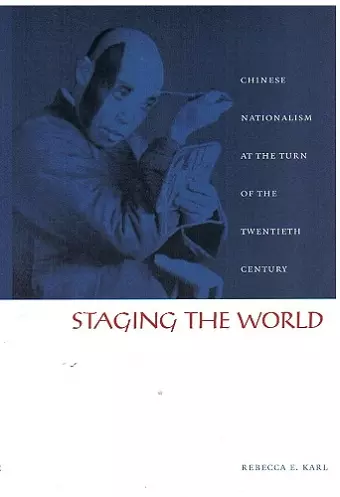Staging the World
Chinese Nationalism at the Turn of the Twentieth Century
Format:Hardback
Publisher:Duke University Press
Published:22nd Apr '02
Currently unavailable, and unfortunately no date known when it will be back

In Staging the World Rebecca E. Karl rethinks the production of nationalist discourse in China during the late Qing period, between China’s defeat in the Sino-Japanese War in 1895 and the proclamation of the Republic in 1911. She argues that at this historical moment a growing Chinese identification with what we now call the Third World first made the modern world visible as a totality and that the key components of Chinese nationalist discourse developed in reference to this worldview.
The emergence of Chinese nationalism during this period is often portrayed as following from China’s position vis-à-vis Japan and the West. Karl has mined the archives of the late Qing period to discern the foci of Chinese intellectuals from 1895 to 1911 to assert that even though the China/Japan/West triangle was crucial, it alone is an incomplete—and therefore flawed—model of the development of nationalism in China. Although the perceptions and concerns of these thinkers form the basis of Staging the World, Karl begins by examining a 1904 Shanghai production of an opera about a fictional partition of Poland and its modern reincarnation as an ethno-nation. By focusing on the type of dialogue this opera generated in China, Karl elucidates concepts such as race, colonization, globalization, and history. From there, she discusses how Chinese conceptions of nationalism were affected by the “discovery” of Hawai’i as a center of the Pacific, the Philippine revolution against the United States, and the relationship between nationality and ethnicity made apparent by the Boer War in South Africa.
“Staging the World fundamentally challenges the conventional assumptions of late-nineteenth- and early-twentieth-century intellectual history and proposes a creative, alternative imagining of the historiography of modern China. This is a rare work of intellectual ambition and righteous moral sense.”—Lionel M. Jensen, author of Manufacturing Confucianism: Chinese Traditions and Universal Civilization
“Rebecca Karl not only explores an exciting period in Chinese intellectual history but also provides an alternative mapping of global relations based on a constellation of common subordinated nations. Those who, like me, are not specialists of Chinese history will find this vision of the world from below a refreshing revelation.”—Michael Hardt, author of Empire (with Antonio Negri)
ISBN: 9780822328520
Dimensions: unknown
Weight: 862g
320 pages